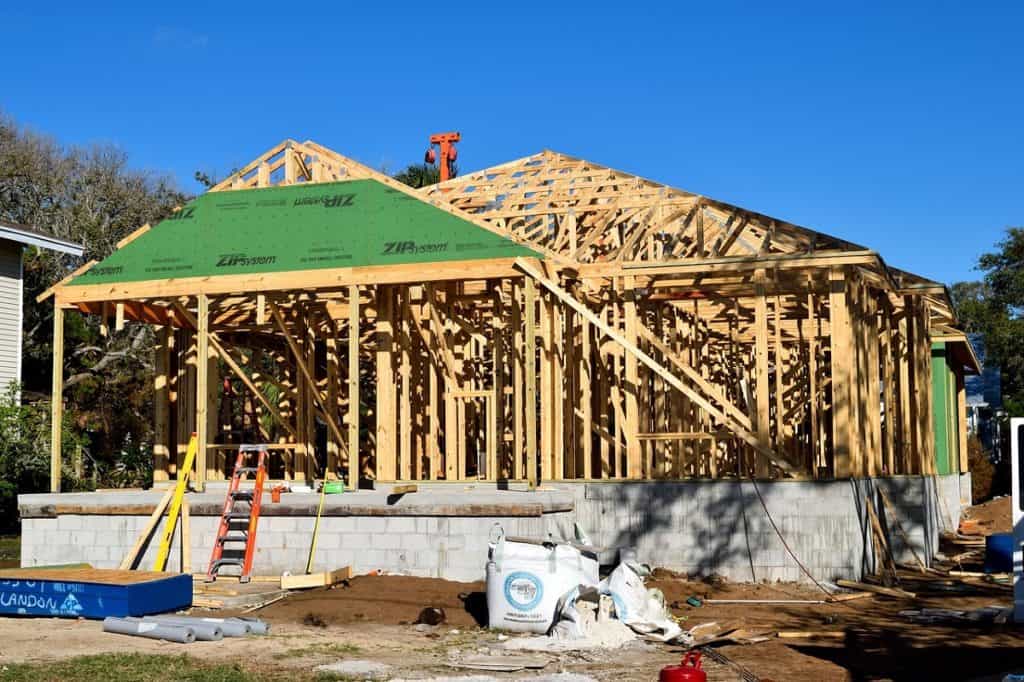There is a phase of planning known in the industry as “pre-construction.” This initial phase of the project serves to lay out the project’s entire scope and schedule for the construction team and the client.
In this article, we’re going to dig deep into what pre-construction is and give you the information you need to fill out your pre-construction checklist.
After reading, you’ll be able to go into any construction project much more knowledgeable about the process and know what to expect when your job is set to begin.
Without further ado, let’s take a closer look at pre-construction.
Table of Contents
What is Pre-construction?
Pre-construction services are preliminary planning and engineering services offered by construction companies before a construction job even begins. This pre-construction planning stage involves defining the project, identifying potential issues, planning and scheduling, the scope, cost estimation, and analysis of the job’s needs.
What is the importance of pre-construction? Quality pre-construction will help a client decide if they can follow through with the construction project. During this pre-construction phase, they may find that the work is either too expensive or not feasible for the space they have.
If the contractor and client agree that work is viable, the contractor will then provide the client with a cost and schedule for the construction project.
The pre-construction phase should give the construction team a clear outline to follow during the job and educate the owner/client on what they will need to do to make their project functional and expect it to cost. This process helps the client better understand the project before they even commit to any work being done.
Pre-construction services come at a cost, which will depend on several factors, including:
- Type of job
- Location
- Scope of project
If the client is unsatisfied with the contractor or isn’t feasible for the client because of cost or constructability, the client can terminate the relationship before construction begins.
This is a much better option (and much less costly) than figuring out you aren’t happy with the work being done, aren’t confident with the contractor’s abilities, or realize the project’s scope is too large for the allotted space after construction has begun.
Outline of the pre-construction process
The pre-construction process is vital to the success of the entire construction project.
Also referred to as the design phase, pre-construction gives owners a full understanding of the project’s cost, scope, and schedule. The project’s success will often be dependent on this phase before a single nail is driven or brick is laid.
Once you enter the pre-construction process, it’s time to become familiar with the pre-construction manager.
What does a pre-construction manager do?
Pre-construction managers look after the pre-construction phase.
It’s their job to:
- Form an understanding of the project
- Assemble a team to do the work
- Create a strategy and schedule
- Develop an understanding of the owner’s business goals, and align the project to match.
While it sounds like a lot, and it is, it’s not that daunting for clients since they don’t have to do any of the work. To help put your mind at ease, here is a step-by-step look at the pre-construction process.
What is the purpose of a pre-construction meeting?
The pre-construction process should always start with a meeting between the client and general contractor.
During this meeting, the two will get a better sense of each other, and the general contractor will understand the client’s wants and needs. Goals and objectives will be defined, and any questions or issues the client has will be laid out for the general contractor to resolve.
The client will give the general contractor their vision for the project, and the general contractor will then get to work to see if that vision is feasible.
A general contractor will determine the project’s feasibility and assess how much work is required to get the job done from this initial meeting. Deliverables will be appropriately defined, and the general contractor will outline a schedule.
What happens after a pre-construction meeting?
Once the meeting has occurred, the general contractor gets to work on the project’s pre-construction design phase.
They will go into the field and visit the construction site to produce a digital schematic of the design and layout. This will then be presented to the client to visualize how the project will look after construction.
Helping clients visualize their project is essential for the general contractor to land the construction job. It will allow them to see that there will be sufficient space for all of the components, equipment, furnishings, and other elements that they want or need.
Output of a Pre-Construction Meeting
Pre-construction meetings that are properly conducted to increase overall project efficiency. A tight network of workers or a workforce who understand their roles and how they fit into the project makes it possible. In addition, they should be able to see the entire project through the eyes of other participants and understand their responsibilities and rights.
These meetings minimize risks and work-related incidences and give room for more significant project profits. The goal is to complete the project in time and within budget while reducing risks and costly delays in the process. Therefore the pre-construction meeting makes the participants analyze their roles comprehensively and identify any likely pop-up problems in time.
Involving your project team at the start helps you identify any sidestep traps in any construction project. In a nutshell, the meeting’s outcome is to make it easy to identify who is expected to follow up with who and who also is responsible for clarifying any gray areas that may arise during the construction process.
A pre-construction meeting is vital so that the production team, workers, and client are on the same page from the jump. It is meant to help manage and set expectations and to begin the construction phase on a strong foot, with the least amount of stress and pressure possible.
They set the course for a successful construction project by setting an agenda, facilitating discussions between all key parties, and coordinating quality assurance and quality control reviews.
Assessment of Engineering
During this portion of the pre-construction phase, the contractor must look into the existing conditions of the space or construction site and figure out what needs to be done for the project.
This will include checking on existing components such as:
- The electric
- Plumbing
- HVAC systems
These checks are necessary to ensure that they will perform in the new construction. If not, they will need to recommend that these items be updated or replaced.
Cost Estimating
The contractor will then put together a preliminary construction budget based on their design and engineering assessment. But how does the contractor come up with a number?
Beyond materials needed and whether or not the components listed in the step above are required, they will also factor in the budgets used for comparable projects. While this estimate will be another vital part of the process, it’s important to note that the cost estimation is not necessarily a bid.
The bid document will be prepared later after other parts of the pre-construction phase are complete, as other elements, such as the final design, will help create a more accurate bid. Here, the contractor is mainly looking to get a close ballpark to the actual price so the client can see if the project will be feasible.
Forming a Responsibility Matrix
The responsibility matrix is used in pre-construction to identify deliverables by all parties involved and will specifically outline:
- Who is responsible for what
- Who is providing what item
- Who will be handling the installation
Since when the project is underway, the client, contractor, and building owner may all have a part to play, this responsibility matrix will keep all parties involved on the same plan and give a clear outline on who has signed up for what.
Clear communication will ensure that the construction project flows smoothly and is done correctly, on time, and on budget.
Define an Initial Schedule
Now that most of the project scope has been laid out, it’s time to formulate a schedule.
The preliminary schedule serves more as a guide to show the client when certain aspects of the job will begin and end. As final decisions for the project are made, this will be fine-tuned, but it gives the client a better idea of the construction timeline.
The contractor will estimate the number of days it will take to complete each task and provide a rough idea of how long it will take to complete the project.
Guidance & Leadership
Pre-construction services involve more than just documents that the general contractor provides to the client. The contractor also will need to guide their client through every step of the process and educate them on what is going on.
The contractor should talk to the client about their options and give them recommendations and what the contractor thinks will be best for their budget or meet their goals.
The ongoing consultations should help the client feel more comfortable about the construction process and ultimately help the contractor win the bid based on their familiarity. Not only will it give the client peace of mind, but it will also save time during the construction phase.
Despite the initial investment, pre-construction also saves money on construction projects because of the value it provides. Good pre-construction allows for value engineering and helps prevent arising issues, each of which can be too costly on a construction project.
Good contractors can provide this guidance because they are the leaders of the project. They lean heavily on their expertise to anticipate potential issues and provide solutions to any of these problems. They will effectively coordinate efforts between the owner, client, architect, and contractor and manage any subcontractors needed for the project.
The contractor should have vast knowledge of all legal issues, permits, and building codes involved so the project stays straight and narrow. They will also be mindful of controlling cost and assessing risk throughout the pre-construction and construction process.

Pre-construction Checklist
Here are some of the items you can expect to cover during the pre-construction phase:
- Initial meeting to discuss the project
- Planning the design
- Estimating costs and offering cost-saving options
- Managing project scope
- Identifying potential issues & outlining solutions
- Determine any options for value engineering
- Site selection and study feasibility
- Evaluating soil condition on site
- Checking existing utilities
- Determining equipment required
- Check for green building options and viability
- Life-cycle analysis
- Outlining contingencies for both client and contractor
Expected Outcomes of pre-construction
The primary outcomes of pre-construction provide include:
- The scope
- Schedule
- Estimated cost of the project
Having all of these elements accurately outlined gives the client the necessary expectations going into construction.
The process also helps to make sure the project is feasible, reducing the chances of encountering issues along the way.
A post-construction phase commonly occurs as a precaution, ensuring issues are taken care of after the pre-construction and construction phases.
Benefits of pre-construction
Pre-construction offers many benefits to both the clients and contractors. The top benefits of pre-construction include:
- Removal of many unknown variables for the client
- They provide a clear picture of what the project will look like and how it will get done
- The completion date for the work can be assessed
- It provides the contractor the opportunity to present potential options for cost savings, which benefit the client.
Evaluating all possible scenarios, upfront gives the client confidence that the contractor they are working with knows what they are doing. Having realistic expectations helps avoid issues while the project is underway. It’s a real win-win for everyone involved.
Output of pre-construction
A critical element for a successful construction project is selecting a great project team. This includes the selection of the design team and construction partner. Early involvement with a construction partner allows the owner and design team to benefit from the cost history, feasibility, construction methods and materials, subcontractor input, and construction experience of the contractor.
In the pre-construction process, the following is essential; project scope, budget, details, team, materials, permits, inspection, and communication.
Project Scope
A client should define the scope of their construction project. This is important as it outlines your objectives, indicating what you want accomplished post-construction, the schedule, space, and the personnel needed in each phase. Be aware of the requirements you need for your project and any limitations that may hinder your success.
Project Budget
After defining your project objectives and goals, analyze the budget you have to ensure you finish the construction. Then, work with your design and construction team to understand the cost implications and design intricacies, track expenses, and formulate means to cut costs without reducing the project’s standard.
Project Details
Once you have a clear project scope and budget, you can discuss the design plans, including; layout, size, style, systems, floor plan, quality, building materials needed, and more. These details help in the better execution of each construction phase and the completion of the whole project.
Project Team
The team set to work on a construction project will influence its practical completion. Based on the project scope, you can decide on the number of people required to attain all tasks needed. As a result, you may require a variety of skill sets.
Based on the scope of your project, you can build the teams needed to accomplish all the tasks required. Depending on the type of project, you may require different sets of teams to meet your goals. It would help if you had a design and construction team at the bare minimum, but consider adding other groups as needed.
To accomplish all your goals. As a contractor bidding out the work, you should identify subcontractors that align with your project goals. Then, with proper communication, ensure that each team member knows their expectation and will create time to bid on the project properly.
Project Materials
In pre-construction, you must know the materials and equipment needed. Therefore, a contractor or sub-contractor should see the number and type of materials in detail before any procurements. This will ensure proper delivery minimizing any delays in the construction schedule.
Project Permits and Inspections
Permits and inspection requirements provided during pre-construction help assess the project and mitigate any risks experienced during construction. Ensure that all safety precautions are adhered to before constructing.
Project Communication
All construction projects need proper communication to be completed. During the pre-construction phase, a client must create a communication plan to guide the entire team throughout the construction. To meet project objectives and goals, project teams should use the best communication methods and constantly exchange information and ideas.
A well-communicated construction team will solve issues and ensure all client needs are met per the budget and schedule.
FAQs
How much does pre-construction cost?
Pre-construction costs will depend on the scope of the project, the location, and more but will usually be somewhere in the range of one to three percent of the project’s total cost.
Pre-construction’s cost is a separate fee from the construction cost, as it comes before a bid for the actual construction is even in place. But as we mentioned above, the potential savings it can provide and the peace of mind make pre-construction worth it.
How long does pre-construction take?
Again, the length of the pre-construction process will depend on the scope of the project. This phase can take anywhere from two to 12 weeks. While 12 weeks may seem like a long time, it really isn’t when you consider the value the pre-construction phase adds to the project.
What is the meaning of a pre-construction meeting?
This is where the construction requirements and expectations are communicated to the project team. The involved parties communicate on the approved drawings and documents.
Is it worth buying pre-construction?
Yes, you are of great advantage to buy pre-construction. The main reason is that the construction is entirely passive in the first five years. After that, a qualified realtor can rent or manage the property at an agreed monthly fee with the investor.
Summary
Pre-construction is considered a promising approach to construction. By having the scope, and expectations well aligned, clients can save on various margins and own property they are pleased with in the long run.

